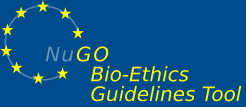- Home
- NuGO Guidelines
-
Definitions
-
Examples
-
Background
-
This is a static version of the NuGO Bioethics Guidelines Tool from 2007. Some links may be outdated. Searching is disabled. Please contact the authors for comments or questions
NuGO Guideline 7
Genotype Information
Disclosure of genotype test results on an individual level |Disclosure of genotype test results on an individual level
Whenever the disclosure of individual genotyping data is considered, the research volunteer concerned should be offered comprehensive information about the implications or possible outcomes of knowing genotype test results. If genotype test results are to be disclosed, the following aspects are relevant:
- Disclosure should be made by an appropriately qualified specialist in a personal communication that encourages the volunteer to ask questions and is adjusted to his/her level of comprehension. The specialist should also have specific counselling skills.
- The research volunteer concerned should also receive the genotyping results in written form containing sufficient information for the treating physician or any other relevant health care professionals.
(see also Recommendations for the training and qualifications of nutrigenomics specialists...)
There is one comment on this page:
Accidentally arising medical information may have to be relayed to the donor, if the information is of critical importance (§ 323c StGB "neglect of duty to provide assistance").
- A legal conflict arises if, and only if, biomaterial has been anonymised that was originally intended for diagnostic or therapeutic use. The contract relationship between doctor and patient obliges the doctor to avoid harm to the patient.
- If the sample had been taken for research purposes only, then the responsibilities of the doctor are confined to the act of material extraction, and do not include subsequent analyses. The general applicability of § 323c StGB does NOT seem to cover covert disease states.
[ Comment by Prof. Dr. Michael Krawczak, www.tmf-ev.de, 2007-09-17 12:00:00 ]
